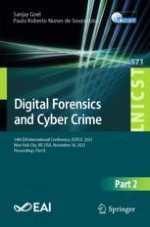2024 | OriginalPaper | Buchkapitel
A Measurement Study on Interprocess Code Propagation of Malicious Software
verfasst von : Thorsten Jenke, Simon Liessem, Elmar Padilla, Lilli Bruckschen
Erschienen in: Digital Forensics and Cyber Crime
Verlag: Springer Nature Switzerland
Aktivieren Sie unsere intelligente Suche, um passende Fachinhalte oder Patente zu finden.
Wählen Sie Textabschnitte aus um mit Künstlicher Intelligenz passenden Patente zu finden. powered by
Markieren Sie Textabschnitte, um KI-gestützt weitere passende Inhalte zu finden. powered by
